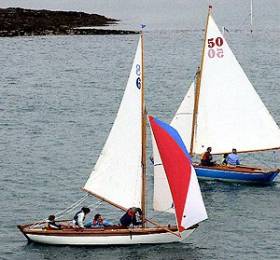Displaying items by tag: Trearddur Bay Sailing Club
Trearddur Bay’s Myths & Seabird Half Raters To Cross Irish Sea For Dun Laoghaire Regatta
#VDLR - Trearddur Bay Sailing Club brings its centenary year celebrations to Dublin Bay this summer as a number of its Myth class and Seabird Half Raters will be making the trip across the Irish Sea for the Volvo Dun Laoghaire Regatta.
Myths are one of the original classes raced since the Holyhead club’s inception in 1919, with three of the 14-footers joining a fleet of five 12-foot Insects — three of the latter, the first boats built for the club, having been restored for the centenary.
While no original Myths remain from those days, the open boat class has seen a resurgence in recent years, and a modern Myth fleet at Trearddur Bay has grown to over 40 vessels.
Designed along the lines of the International 14 but inspired by what the club calls “a hotch-potch of ideas”, Myths are distinguished as much by their tight specification as their turkey red sails and either white-painted or varnished hulls that comprise five different types of wood.
With the Myth class now in its 99th year, its lasting legacy is no doubt also connected to the boat’s particular suitability to the environment of Trearddur Bay — not to mention the absence of an age barrier when it comes to racing, as young and old can compete on equal terms.
They are matched by the Seabird Half Rater — which was adopted in 1922 and is one of the oldest one-designs still sailing in British waters — at a club which currently has a strong dinghy scene with Mirrors, Fevas and Optimists among a full member list of more than 1,100 that sails every August.
Due to the uniquely short season, Trearddur Bay’s members regularly sail and race at other clubs, so some of the contingent will likely be no strangers to the waters of Dublin Bay as they join the likes of Olympic medalist Mike McIntyre at the biennial regatta — and Ireland’s largest sailing event — from 11-14 July.
The entry form for the Volvo Dun Laoghaire Regatta 2019 is available HERE. Early bird entry fees are available up to Sunday 31 March.





























































